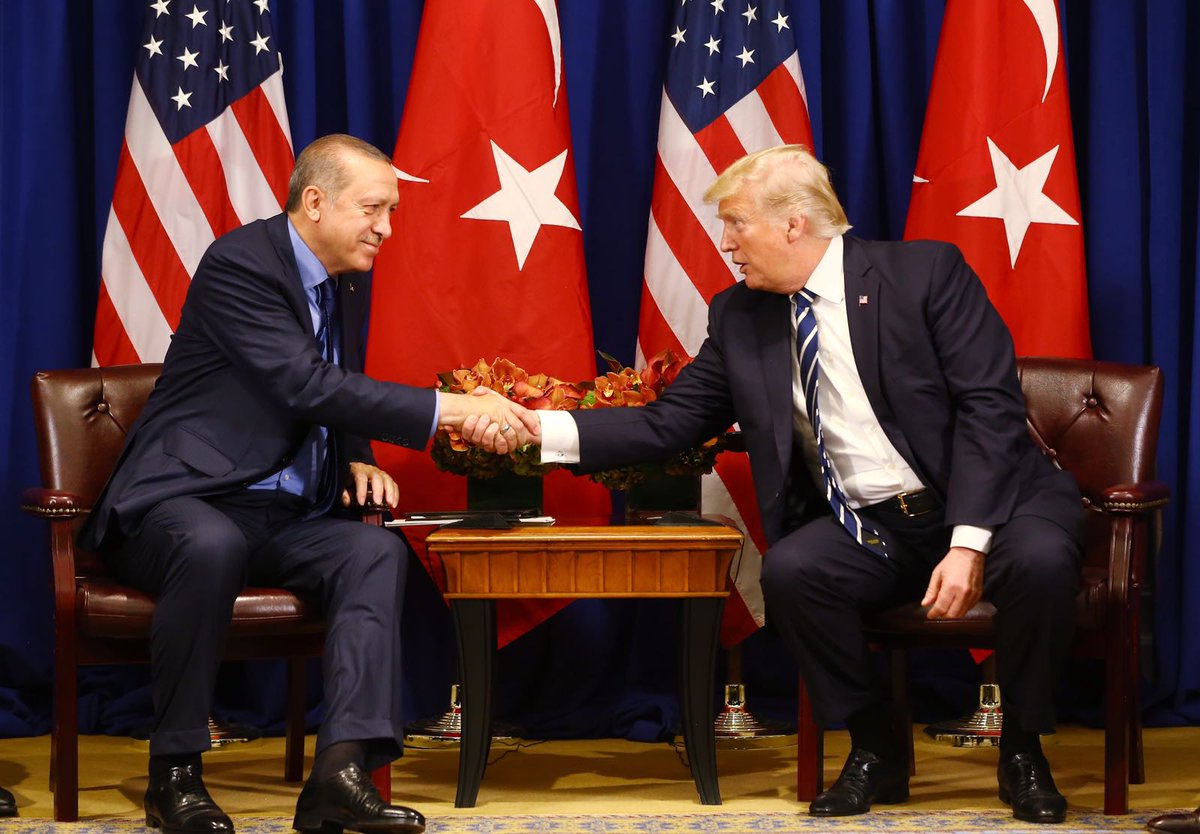U.S. President Donald J. Trump has been at odds with many world leaders. However, Turkish President Recep Tayyip Erdogan is seemingly not one of them.
“I think now we are as close as we’ve ever been,” Mr. Trump said in a press conference on Thursday talking about his Turkish counterpart.
“He [Mr. Erdogan] is running a very difficult part of the world. He’s involved very, very strongly and, frankly, he’s getting very high marks. And he’s also been working with the United States,” the president added.
But behind this expression of friendship lay stark realities that restrict the ability of the leaders to work together.
Hours before the two presidents’ meeting on Thursday, Mr. Erdogan’s bodyguards punched a protester at a New York event. The incident reminded a similar attack that took place in May and resulted in an indictment against 15 Turkish security officials who brutally beat participants of a rally outside the Turkish embassy in Washington, DC.
The indictment has become a source of enduring friction between the two allies. President Erdogan said earlier this week that Mr. Trump expressed sorrow over the whole situation. Following the remarks, the White House issued a statement noting that the two leaders did discuss the issue, but there was no apology on the U.S. part.
Dr. Lisel Hintz, Assistant Professor of International Relations at Johns Hopkins University, told The Globe Post that the U.S. and Turkey have made “no fundamental progress” on the indictment of Turkish officials and on Turkey’s request for the extradition of cleric Fethullah Gulen, blamed by Ankara for the failed 2016 coup.
In addition, there has been lack of development in talks on U.S. support for Kurdish YPG forces in Syria and on Ankara’s decision to purchase S-400 missile defense systems from Russia, which are incompatible with NATO technology.
“The friendly words that President Trump used to describe Turkish President Recep Tayyip Erdogan in no way reflect the tension that exists in relations between the US and Turkey. As is his nature, Trump spoke off the cuff in sweeping, meaningless generalizations that have nothing to do with reality on the ground,” Dr. Hintz said.
“To make a comment that ‘frankly, he is getting very high marks’ reflects an utter, and utterly embarrassing, lack of knowledge about Turkey’s domestic and foreign policies and those who are evaluating them,” she added.
Howard Eissenstat, Associate Professor of history and a Turkish affairs expert at St. Lawrence University, told The Globe Post that Trump’s warm public embrace of Mr. Erdogan was “a political gift for the Turkish president, burnishing his reputation at home and suggesting that rights violations will not, in fact, damage his relations with the United States.”
“Erdogan may even believe that. But the truth is that relations with the US are likely to grow more rather than less tense. Trump’s protestations of goodwill won’t change basic divisions over Syria. And they are likely to sharpen rather than diminish Congressional determination to intervene in US-Turkish relations,” he added.
Mr. Erdogan primarily wants just two main things from Washington, Dr. Jenny White, Professor at Stockholm University Institute for Turkish Studies, told The Globe Post.
“He would like the U.S. to end support for the Syrian Kurdish YPD in their fight against ISIS,” she said. “Turkey also wants President Trump to extradite Fethullah Gulen, a Turkish cleric who lives in self-exile in Pennsylvania and leads a global Muslim movement focused on secular education and business.”
Ms. White said that despite Ankara’s wish for Gulen to be extradited, Turkey has not presented the U.S. courts with enough proof of his complicity to make that possible.
She added that the U.S., in its turn, would like to ensure the release of 15 Americans presently held in Turkish jails.
“If indeed none of these issues were raised, then we can consider President Trump’s over-friendly overtures misplaced or at the very least insincere,” Ms. White concluded.
There has been no progress on another issue that Turkey considers important.
Ankara has been trying to secure the release of Turkish-Iranian businessman Reza Zarrab who was charged by the U.S. of violating sanctions against Iran.
“I think that President Erdogan retains some hope of finding leverage with President Trump on the Zarrab case…. certainly it is a very high priority for Mr. Erdogan and a very low one for Trump,” Mr. Eissenstat said.
He noted that any attempt by President Trump to intervene in the case would result in a dramatic response from Congress and, most likely, from the Justice Department too.
“Mr. Trump is certainly a risk-taker, but I can’t imagine he’ll stir that hornet’s nest for Mr. Erdogan’s sake,” Mr. Eissenstat said, noting, however, that the Turkish president still hopes for a renewed relationship with the Trump administration.
Nevertheless, there is little hope for a smoother relationship in the near future.
“More broadly, it does not seem like either party really understands the priorities and needs of the opposites. There isn’t a lot that holds the United States and Turkey together right now, and neither side seems capable of papering over the differences,” Mr. Eissenstat said.
“Add to that Congress’ clear and growing frustration with Turkey, and we are likely looking at a very fraught period of re-evaluation for both sides. The relationship is unlikely to end in divorce, but the marriage will increasingly be an unhappy one,” he added.


